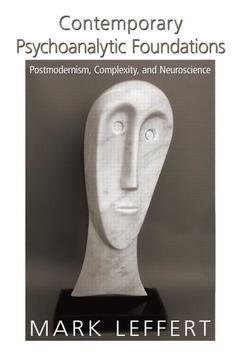Contemporary Psychoanalytic Foundations Postmodernism, Complexity, and Neuroscience
Auteur : Leffert Mark

Past scholars have tried to classify psychoanalysis as an intrinsically positivist science, with varying degrees of success. Their critics have fared little better with narrow applications of postmodern thought, which focus on smaller areas within psychoanalysis and, as a result, neglect the evolution of the discipline as a whole.
In an effort to provide a ground for current psychoanalytic thought, Mark Leffert creates an interreferential schema which balances the influences of postmodernism, complexity theory, and neuroscience as its key factors. Using the heterogeneity of postmodern thought as a starting point, he traces its impact on and implications for the development of the discipline, leading into the realm of complexity theory ? which is relatively new to the psychoanalytic literature ? and how it informs as well as constrains certain psychoanalytic assumptions. The book then turns to neuroscience, the "hard" scientific study of the complexities of the brain, and how recent research informs psychoanalytic theory and may shed light on aspects of memory, the conscious, and the unconscious. Taken together, these three elements create a firm basis for the current trends in psychoanalysis and the direction of its development in the years to come.
Introduction. Postmodernism and its Impact on Psychoanalysis. Modern and Postmodern Trends in Psychoanalysis: A Contemporary Integration. Complexity and Postmodernism in Contemporary Theory of Therapeutic Change. Neuroscience, August 2007: Memory, Mind, and Psychoanalysis. Unconsciousness: The Unconscious and the Not-conscious. Consciousness and the Self. Power and Politics in American Psychoanalysis. Not in Kansas Anymore.
Mark Leffert, M.D., has been on the faculty of five psychoanalytic institutes and has been a training and supervising analyst at four of them, including the New Center for Psychoanalysis where he is also chair of the NCP’s Training Analyst Section Committee. His professional interests include conducting analysis and therapy via telephone as well as a critique and reformulation of psychoanalysis based on the interrelation of postmodernism, complexity theory, and neuroscience. He has a private practice in Santa Barbara.
Date de parution : 04-2010
15.2x22.9 cm
Date de parution : 04-2010
15.2x22.9 cm
Thèmes de Contemporary Psychoanalytic Foundations :
Mots-clés :
american; association; autonoetic; consciousness; episodic; memory; sustained; empathic; inquiry; cognitive; Anorexia Nervosa; Analytic Space Functions; Strange Attractors; Muslim World; Neurological Intensive Care Unit; Intralaminar Thalamic Nuclei; Sand Pile; Autonoetic Consciousness; Pet Scan; Split Brain Studies; APsaA Institute; Mental Time Travel; Modern Critical Stance; Autonoetic Memory; Rb Function; Antianxiety Agents; Global Workspace; Out-of Equilibrium Systems; Semantic Memory; Secondary Process Functions; Lay Analysis; Patient Analyst Dyad; Contemporary Psychoanalytic Foundations; Wider Issue; Therapeutic Itinerary



